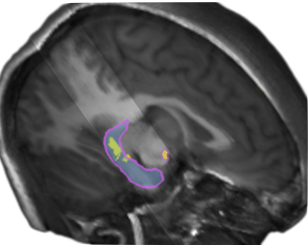Adcock Lab
Education
Dr. Adcock received her MD and PhD from Yale University. She completed a residency in psychiatry and a postdoctoral fellowship at University of California San Francisco, and is a diplomate of the American Board of Psychiatry and Neurology.
Motivated Memory Lab
We study how the neuromodulatory systems shape models of the world held in long-term memory. Our approach uses human brain imaging to study explicit and implicit behavior during the active acquisition of information. We hope to leverage our findings into "behavioral neurostimulation" strategies for better mental health and educational practice.
Memory is at the core of human identity. It underlies the ability to identify those we love and to tell stories. Our memory also allows us to understand the present, foresee our future, and make good decisions. However, we know that memory is not simply a veridical record of physical reality. Many things happen to us, and of those we remember some in detail, some vaguely, some incorrectly, and some not at all.
Research in the Adcock laboratory focuses on the neural systems that allow what we desire to influence what we remember, for better and for worse. We use functional Magnetic Resonance Imaging (FMRI) activation (increases in image brightness that reflect changes in the oxygen levels in the brain) to measure how changes in brain activity relate to both motivation and memory. By looking at activation of neural “pleasure” circuits before and during memory formation, we have shown that even before you have an experience (e.g., seeing a picture), there are neural markers that predict whether or not you are going to remember it. The ability afforded by FMRI to look at an individual person’s brain as it changes, moment-to-moment, allows us to return to decades-old but still unresolved questions about how motivation influences learning new information. We can now integrate these data with other psychological and biological data we collect prior to and during memory formation to identify the key antecedents of lasting memories.
Our research program represents an approach guided by and aimed at understanding neurobiology, as well as psychology. This integrated approach may help us understand how our brains ensure that we remember what is important and useful, and help us capitalize on that understanding for human advancement.
Adcock Research

Functional Architecture
How do we preferentially remember what we want to remember? How does your brain selectively encode the memories that are more valuable? Our laboratory uses novel behavioral paradigms in conjunction with functional neuroimaging to understand the functional architecture underlying motivated memory.
State and Trait Differences
How are relatively stable predispositions of biological trait or psychological personality trait involved in the dopamine-modulated enhancement in receptivity to learning and memory? On the other hand, how does transitory and labile conative state differences induced by various experimental manipulations with respect to reward context account for the underlying mechanisms of reward-motivated memory formation? A series of projects in our lab is dedicated to exploring these state and trait differences.
Neurochemistry
In our laboratory we pursue a mechanistic neurobiological understanding of the phenomenon of motivated memory. Specifically, we study the effects of neuromodulatory neurotransmitter systems -- the neurochemistry -- on memory formation in the human brain, with a particular interest in the reward-driven neuromodulation of episodic memory formation that is likely to involve the dopaminergic system.
Behavioral Neurostimulation
Expanding the definition of neurostimulation. Are there ways to directly stimulate neural pathways non-invasively? We are calling it behavioral neurostimulation; that is, using the environment or a mental strategy -- not an implanted device -- to target activity in neural circuits involved in emotion, motivation, and reward processing and thereby enhance learning and memory.
Novelty
We often conflate novelty and expectancy violations and use these terms synonymously, even though, in the real-world, these can occur separately or together. This is further perpetuated by the fact that we tend to only study novelty and expectancy violations together in the laboratory setting. In our lab, we are seeking to dissociate novelty and expectancy violations in order to understand the unique neural networks that encode novelty, expectancy violations, and the combination of both.
Adcock Publications
Chiew, Kimberly S., Bailey B. Harris, and R Alison Adcock. “Remembering Election Night 2016: Subjective but not objective metrics of autobiographical memory vary with political affiliation, affective valence, and surprise.” J Exp Psychol Gen 151, no. 2 (February 2022): 390–409. https://doi.org/10.1037/xge0001080.
Sinclair, Alyssa H., Grace M. Manalili, Iva K. Brunec, R Alison Adcock, and Morgan D. Barense. “Prediction errors disrupt hippocampal representations and update episodic memories.” Proc Natl Acad Sci U S A 118, no. 51 (December 21, 2021). https://doi.org/10.1073/pnas.2117625118.
Dickerson, Kathryn, Jia-Hou Poh, Shabnam Hakimi, Rachael Wright, Kelly Eom, Benjamin Muzekari, Scott Kollins, and R Alison Adcock. “Cognitive Neurostimulation of Dopaminergic Midbrain via fMRI Neurofeedback Training Increases Willingness to Exert Effort in ADHD.” In Neuropsychopharmacology, 46:134–134, 2021.
Haugg, Amelie, Fabian M. Renz, Andrew A. Nicholson, Cindy Lor, Sebastian J. Götzendorfer, Ronald Sladky, Stavros Skouras, et al. “Predictors of real-time fMRI neurofeedback performance and improvement - A machine learning mega-analysis.” Neuroimage 237 (August 15, 2021): 118207. https://doi.org/10.1016/j.neuroimage.2021.118207.
Sinclair, Alyssa H., Shabnam Hakimi, Matthew L. Stanley, R Alison Adcock, and Gregory R. Samanez-Larkin. “Pairing facts with imagined consequences improves pandemic-related risk perception.” Proc Natl Acad Sci U S A 118, no. 32 (August 10, 2021). https://doi.org/10.1073/pnas.2100970118.
Sinclair, Alyssa H., Matthew L. Stanley, Shabnam Hakimi, Roberto Cabeza, R Alison Adcock, and Gregory R. Samanez-Larkin. “Imagining a personalized scenario selectively increases perceived risk of viral transmission for older adults.” Nature Aging 1, no. 8 (August 2021): 677–83. https://doi.org/10.1038/s43587-021-00095-7.
Hakimi, Shabnam, Jeffrey J. MacInnes, Kathryn C. Dickerson, Kelsey McDonald, and R Alison Adcock. “Embedded Temporal Patterns in the Feedback Signal Differentially Predict VTA Neurofeedback-Mediated Learning to Self-Regulate Motivation.” In Neuropsychopharmacology, 45:378–79, 2020.
Haugg, Amelie, Ronald Sladky, Stavros Skouras, Amalia McDonald, Cameron Craddock, Matthias Kirschner, Marcus Herdener, et al. “Can we predict real-time fMRI neurofeedback learning success from pretraining brain activity?” Hum Brain Mapp 41, no. 14 (October 1, 2020): 3839–54. https://doi.org/10.1002/hbm.25089.
Botvinik-Nezer, Rotem, Felix Holzmeister, Colin F. Camerer, Anna Dreber, Juergen Huber, Magnus Johannesson, Michael Kirchler, et al. “Variability in the analysis of a single neuroimaging dataset by many teams.” Nature 582, no. 7810 (June 2020): 84–88. https://doi.org/10.1038/s41586-020-2314-9.
MacInnes, Jeff J., R Alison Adcock, Andrea Stocco, Chantel S. Prat, Rajesh P. N. Rao, and Kathryn C. Dickerson. “Pyneal: Open Source Real-Time fMRI Software.” Front Neurosci 14 (2020): 900. https://doi.org/10.3389/fnins.2020.00900.
Lab Members
Adcock Funding
Our research is made possible in part by NARSAD, The Dana Foundation, The Esther A. & Joseph Klingenstein Fund, The Alfred P. Sloan Foundation, APIRE/Merck, the National Institutes of Health, and taxpayer support.
Join/Contact Adcock Lab
Directions
Adcock Lab CO3F
Levine Science Research Center
Duke University
450 Research Dr.
Durham, NC 27708
Participate
In a study:
1. Email to inquire about participating in a particular study or to find out which studies you may be eligible for: adcocklab@gmail.com
You may also call (919) 681-4601 and leave a message.
2. A researcher will contact you and go over the screening questions.
3. Download and fill out any forms for your study (if necessary).
4. Bring the forms with you to the lab or to BIAC on the day of the study.
If you would like to apply as a research assistant, graduate student, orpostdoctoral fellow, then contact Dr. Alison Adcock at alison.adcock@duke.edu. If you are interested in a research assistant position, please e-mail both alison.adcock@duke.edu ANDadcocklab@gmail.com.
For Research Assistants
Do we preferentially remember what we want to remember?
Are you more likely to remember how to get to a concert you're excited to see, or how to get to the DMV?
How might excitement influence what you can learn and remember? Does your brain "edit" experience and manipulate the contents of memory depending on what matters to you? What happens if affective modulation of neural plasticity goes wrong?
Research in the Adcock lab is aimed at a multi-resolution understanding of the neural systems that permit motivational or affective states (e.g., excitement) to shape neuronal plasticity, particularly in hippocampal-dependent memory processes. Our initial studies demonstrated that even before you have an experience (e.g., seeing a picture), neural markers predict whether or not you're going to remember it - namely brain activation in neuromodulatory “pleasure” circuits and in the hippocampus. By offering participants rewards for learning, we were able to elicit these preparatory activations, which appeared prior to valuable pictures that were later remembered. We also enhanced learning.
Spurred by this finding that reward motivation can set up the brain to learn, we are currently pursuing three key lines of research at the intersection of affect and cognition. These investigations, like our initial studies, test predictions drawn from both psychology and the neurobiology of modulatory brain systems. We employ a combined approach of behavioral testing, fMRI, physiology and psychophysics to address these related questions:
I. What are the physiological mechanisms of predictive, affective neuromodulation of memory, both normal and abnormal? How do these vary across individuals, particularly as indexed by genotype?
II. What is the "grammar" of reward-motivated neuromodulation of neural plasticity? How do the mechanisms differ in explicit vs. implicit learning? How does reward-motivated learning differ from aversion-based learning? How does affective neuromodulation of plasticity influence perception?
III. How can we manipulate these mechanisms "on the fly", via psychology and biology? Can we use these manipulations to enhance learning-based therapies? To enhance education and persuasion?
The Adcock lab has positions available for undergraduate research assistants who are eager to participate in this exciting field of study, and who are looking to gain the valuable experience of working first-hand in a cognitive neuroscience research laboratory. If you are interested, please email both alison.adcock@duke.eduand adcocklab@gmail.com. Include information regarding your name and contact information, area of concentration, previous research experience, and a brief paragraph describing your reasons for applying. Please include any questions you may have, as well.
